My Global Health Philosophy
Education
Education is strongly linked to determinants of health, such as health behaviours, risk contexts and use of preventive services. Education in global surgery aims to equip local people with skills and attitudes, to make informed decisions which contribute to safer surgical outcomes in their context. Several tools that I used in the Rwanda program include: regional anaesthesia curriculum design, simulation and workshop teaching, training of teachers, and SAFE anaesthesia course leadership.
Knowledge Translation
Without implementation strategy, effective medical education will not result in outcome change. A nuanced understanding of barriers and facilitators affecting implementation is required to translate knowledge into action. I have led qualitative research through my work in establishing a regional anaesthesia service in Rwanda.
Advocacy
Implementation of safe surgery practice can only be sustained by broad engagement with, and transfer of responsibility to, local staff. Personal mentorship through regular visits and long-distance communication; building collaborative international institutional partnerships; and raising support amongst local authorities are the keys to this process.







